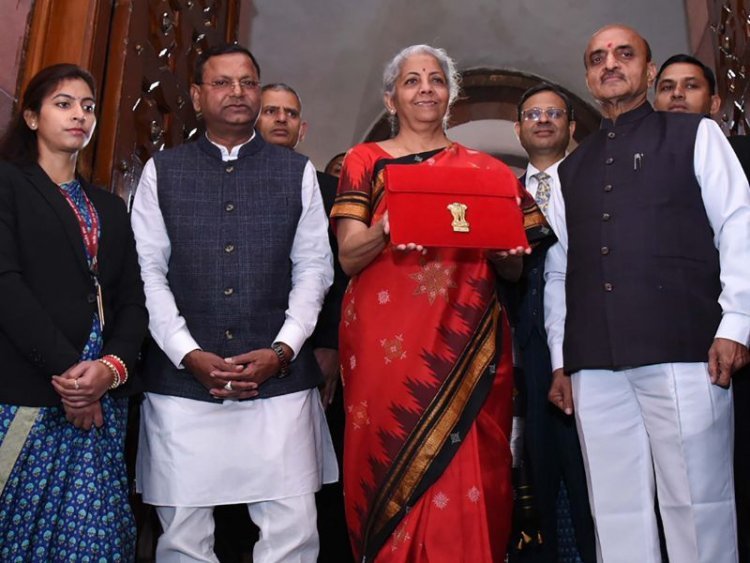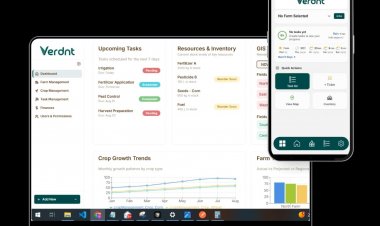India Inc & startups give thumbs up to the Budget, say it will accelerate technology adoption in the agriculture
India Inc and startups have given a thumbs up to Budget 2023-24, saying provisions for the agriculture sector were highly welcome. The FICCI welcomed the Union Budget as balanced and progressive, one that gave primacy to inclusive growth. ASSOCHAM President Sumant Sinha said the announcements made in the budget will improve the ease of doing business and help the MSME sector.

India Inc and startups have given a thumbs up to Budget 2023-24, saying provisions for the agriculture sector were highly welcome. The Federation of Indian Chambers of Commerce and Industry (FICCI) welcomed the Union Budget as balanced and progressive, one that gave primacy to inclusive growth. ASSOCHAM President Sumant Sinha said the announcements made in the budget will improve the ease of doing business and help the MSME sector.
D Narain, President, Bayer South Asia and Global Head of Smallholder Farming, Bayer, noted that this year’s budget clearly identifies seven priority areas that will not only lead to rapid economic growth in the country but also create an empowered and inclusive India.
The budget’s focus on millets, growing rural credit, promoting micro-entrepreneurship, and rural infrastructure highlights the importance of agriculture in driving economic growth in the country. The finance minister’s announcement on setting up an Agri focused accelerator fund and to build an open-source digital infrastructure, will accelerate technology adoption in the agriculture sector and help farmers to access markets, Narain said.
“The impetus to innovation is not limited only to the agriculture sector. The announcement of a new program to promote R&D in the pharmaceutical sector is another welcome move. It will not only spur investment in this space but also has the potential to make India the hub for new drug discovery and development, helping to address the unmet health needs of millions of Indians. Additionally, with a proposed boost to clean energy and a scheme to protect biodiversity and wetlands, the budget does well to promote sustainable practices and encourage climate-friendly policies,” Narain added.
Simon-Thorsten Wiebusch, Executive Director, Bayer CropScience Limited, Country Divisional Head - Crop Science Division of Bayer for India, Bangladesh & Sri Lanka, believes a robust and growing agriculture sector is not only an economic imperative but also a social one, especially in a vibrantly developing country like India.
“Be it the expansion in credit growth or the empowerment of smallholder and marginal farmers by enhancing their coverage in the formal credit system, this year’s budget has specific measures to boost agricultural productivity, increase farmer incomes, capability building for rural youth and grow the rural economy, at large.
"With India moving up from the 10th to the 5th largest economy in the world, and taking on the G20 presidency, key allocations and announcements made in this budget will set it on the path to attaining people-centric sustainable growth and food security of the nation,” he added.
Ramesh Doraiswami, Managing Director & CEO, National Bulk Handling Corporation (NBHC) said, "The Union Budget 2023-24 proposes a continued focus on the key areas of improving farmgate infrastructure and promoting the use of technology to improve farm incomes.”
The creation of Digital Public Infrastructure for Agriculture is commendable as it will be an open source of information services for crop planning and health, improved access to farm inputs, credit, and insurance & market intelligence, which today are not available readily to farmers thereby limiting their income, he said.
The announcement of the Agriculture Accelerator Fund to promote rural entrepreneurship focussed on agriculture is another welcome step. It will be interesting to see the details of this fund since it could also stimulate rural employment, he said.
In the “International Year of the Millet”, the announcement to make IIMR Hyderabad a global centre of excellence of millets is a big step forward as well. “Overall, the budget presents a positive outlook for the agriculture sector and is likely to have a positive impact on the growth of agri-tech companies,” Doraiswami said.
On the other hand, Abhishek Jain, Fellow & Director, Powering Livelihoods, CEEW, said, “Over the years, we have seen hundreds of agri-focused start-ups bridging the information gap for the farmers but limited innovation on hardcore technologies. I hope that the newly announced Agriculture Accelerator Fund brings an explicit focus on hardware technological innovations to address challenges like pest and weed management, affordable storage and post-harvest solutions, as well as innovations for the livestock and allied sectors."
Akash Agarwal, CEO, New Leaf Dynamic Technologies, was of the opinion that implementing decentralised storage facilities is a firm step to doubling farmers' income. This will reduce post-harvest losses to less than 5% at the farm gate; a figure comparable to developed countries.
Vasanth Madhav Kamath, Founder & CEO of Hydrogreens Agri Solutions, said “Green energy, green farming, distributed bio fertile production centers, increase of agri credit to 20 lakh crores, and a further push for agri accelerators are great actions to catalyse productivity while also nudging environmentally sustainable practices.
Ankit Alok Bagaria, Co-Founder, Loopworm, termed the Union Budget 2023-24 as “short and crisp”, saying that the budget would help farmers, established businesses, and Startups in the Agri & Allied Agriculture space.
“The Rs 6000 crore infusion to promote fisheries would help Shrimp farming the most. Decreasing import duties on feed ingredients are going to help the feed manufacturers and help formalise animal agriculture but would lead to reduced margins for domestic feed ingredient manufacturers. For young startups, the agri accelerator fund is a good initiative but there was less focus to promote Agri-Startups at the growth stage. Funds to support Bio-based products to promote natural farming should boost the plant Biostimulant & Bio-fertiliser industry,” stated Bagaria, while welcoming the budget.
“Significant agricultural credit support and significant fund infusion in allied agri sectors should promote existing farmers and people looking for secondary income streams to set up livestock/ poultry/ fish/ insect farms which would lead to a growth in non-arable land agriculture,” he added.
Naresh Kumar, Chief Business Officer, Kissandhan Agri Financial Services Pvt Ltd (Kissandhan), a wholly owned subsidiary of Sohan Lal Commodity Management Pvt. Ltd. (SLCM), said the budget focuses a lot on the supply and input side of the agricultural value chain. The government plans to set up massive decentralised storage capacities that will help farmers to store their produce and realise remunerative prices. The shift towards decentralised storage is also an important step in reducing wastage and helping increase the shelf life of agricultural produce.
It will not only arrest the post-harvest loss, but also be an enabler and catalyst for increasing farmers returns when coupled with 10,000 FPO program, Operation Greens and eNWR (electronic negotiable warehouse receipts), thereby contributing towards doubling farmers’ income, he said.
The agriculture accelerator announcement for promoting start-ups in ag-tech enterprises will help increase yield and productivity on the supply side while also enhancing price realisation for the farmer on the demand side through more efficient market linkages, he said, adding that the budget proposes to increase the agricultural credit target to Rs 20 lakh crore with a focus on animal husbandry, dairy and fisheries, which will facilitate in increasing farm-level productivity.
Neeraj Choudhary, Group Head Finance, Absolute, expressed the view that the government's commitment to ‘green growth’ approach is a step towards building a cleaner India. The government has clearly sent across a strong message that sustainability has to be central to economic and social growth. As per Economic Survey, agriculture has performed well but the sector needs "re-orientation" to overcome challenges like adverse impacts of climate change, rising input cost, etc.
Backed by the financial allocation, the move to create Agriculture Accelerator Fund will act as a catalyst to not only encourage agripreneurship but also unlock value in the agribusiness value chain that will boost profitability for the farmers, he added.
Aneesh Jain, Founder, Gram Unnati - Agritech said, "The budget is a game changer for the agriculture sector in India. The government has taken bold steps in digitising the sector with the creation of an open-source digital public infrastructure and accelerator fund."
Mark Kahn, Managing Partner, Omnivore, said, "With the Union Budget 2023, the Centre has continued their strong focus on improving farmer incomes."
Pushkar Limaye, Co-Founder and CTO of Carnot Technologies funded by Mahindra & Mahindra said, "The Agriculture Accelerator Fund setup is a huge and important setup in helping the agricultural sector grow. This is a huge incentive for agro startups to work towards crafting solutions for the existing problems of our agriculture sector."
RG Agarwal, Chairman, Dhanuka Group said, "The budget for 2023-24 is in line with the Prime Minister’s vision of Aatmanirbhar Bharat. It has laid greater emphasis on infrastructure development which will have a multiplier effect across sectors including the rural economy."
Harsha Razdan, Partner and Head, Consumer Markets and Internet Business, KPMG in India said, “The Budget this year has laid out a credible roadmap based on the foundations of the previous budgets. The focus has been to foster inclusive development and provide a strong impetus to job creation whilst also rekindling the investment cycle by reduction in personal taxes.
"Further, increasing capex investments also reassures the long-term view of the government for rural growth and development," Razdan added.



 Join the RuralVoice whatsapp group
Join the RuralVoice whatsapp group









































